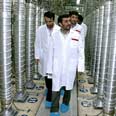
Ashton: Iran's stance at nuke talks 'disappointing'
During negotiations in Istanbul, Tehran rejects world powers' proposal for improved UN monitoring of its nuclear activities; no new talks planned. Scientists' report: Iran's atomic activities do not seem to be slowing down
Six world powers were "disappointed" with the stance taken by Iran during nuclear talks in Istanbul, and its preconditions were unacceptable, European Union foreign policy chief Catherin Ashton said on Saturday.
Addressing a news conference at the end of the two days of talks, Ashton said there were no further meetings planned at present, but the door remained open for Iran.
"The process can go forward if Iran chooses to respond positively," she said. "We now wait to hear...whether Iran will respond on reflection."
Proposals by the six powers for improved UN monitoring of Iran's nuclear activities were rejected by Tehran, as were attempts to kickstart dialogue through reviving a subset of international talks focusing on Iran shipping out a limited amount of its enriched uranium in exchange for fuel for its research reactor, Ashton said.
"We had hoped to have a detailed and constructive discussion of those ideas," she said. "But it became clear that the Iranian side was not ready for this unless we agree to preconditions related to enrichment and sanctions.
"Both these preconditions are not the way to proceed," she told reporters.
While no new talks were planned, Ashton said "our proposals remain on the table."

Jalili and Ashton during last year's talks (Archive photo: Reuters)
Iran's chief negotiator Saeed Jalili said any accord between Iran and world powers over its nuclear program should be based on Tehran's right to nuclear technology, including uranium enrichment.
"Any kind of talks and cooperation, as I underlined during the talks with Mrs Ashton, should be based on respecting the nations' rights... including Iran's right to nuclear technology," he said, specifying Iran's right to a nuclear fuel cycle and uranium enrichment.
During the talks Iran rejected a request to hold a bilateral meeting with the United States.
A report published on Friday by the Federation of American Scientists (FAS) said Iran has the technical capability to make a nuclear weapon and its atomic activities do not seem to be slowing down.
"Calculations based on IAEA (International Atomic Energy Agency) data show that Iran has increased its enrichment performance over the past year," said Ivanka Barzashka, an FAS research associate.
"Contrary to statements by US officials and many experts, Iran clearly does not appear to be slowing down its nuclear drive."
Enriched uranium can be used to fuel power stations, Iran's stated ambition. It can also provide material for atom bombs if refined much further, which is what the West suspects the Islamic Republic is ultimately aiming for.
Reuters, AP contributed to the report
- Follow Ynetnews on Facebook










